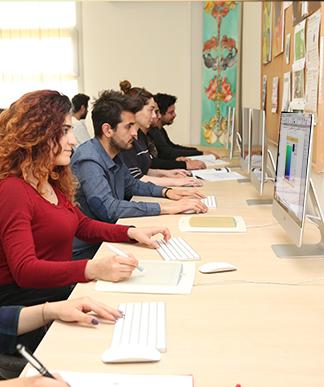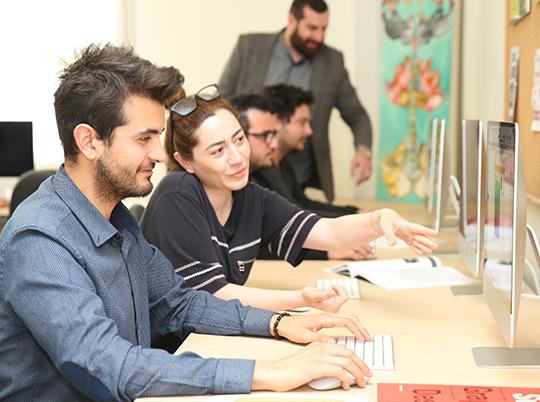


About the Program
The main objective of the Digital Game Design program is to teach students the most up-to-date tools and technology for producing digital and interactive content in order to prepare its graduates for the future. Through courses that are in line with what the market needs right now, the Program gives students the opportunity to develop their artistic expression, as well as their practical skills and knowledge. In addition to classes in 2D and 3D animation, sound design, storyboarding, character creation, and game technology, the course curriculum will include a foundation of classic drawing, illustration, and art courses.
Education Opportunities
Education will be effective if there is a careful balance between theoretical and practical training. Students will not only understand the fundamental ideas behind animation and game design, but they will also be able to apply this knowledge to a variety of different fields. In short, the program aims to transmit to its students both specialized knowledge in the tools necessary for success in the field of interactive entertainment and high technical competence in fundamental artistic concepts. Through possibilities for internships and special projects, the program also aims to foster students' creative abilities. This helps them establish their own aesthetic and a high degree of personal excellence and professionalism. The department has cutting-edge equipment that will enable students to create games and animations of the highest caliber. Additionally, students have access to a motion capture facility for lifelike human animations. Additionally, students have plenty of production chances thanks to a fully stocked green screen studio and a high-quality photography studio. Students have access to television studios, audio studios, editing rooms, and video equipment within the faculty.

Career Areas
There are many job prospects available for graduates of the Digital Game Design degree in a variety of industries. For instance, graduates will have little trouble finding employment as producers, art directors, animators, character designers, interface designers, and visual effects supervisors in animation and game design companies, advertising agencies, production companies, and TV stations. Students will also be able to launch their own production companies and serve the worldwide animation and game design markets because to the relatively low business entry expenses.
Contact
Faculty of Communication
Çevik Uraz Center, CU124
Tel: +90 392 671 1111 Extension: 2301
Faculty E-mail: secretary-foc@ciu.edu.tr
Head of Department: Assoc. Prof. Dr. Dilan ÇİFTÇİ
Head of Department E-mail: dciftci@ciu.edu.tr
Compulsory Courses
First Semester
INTRODUCTION TO MASS COMMUNICATION
Course code
COMM101Credit
3Theoretical
3Practical
0Ects
6INTRODUCTION TO ANIMATION AND GAME DESIGN
Course code
GADS101Credit
3Theoretical
2Practical
2Ects
5DRAWING AND CLAY MODELLING
Course code
GADS103Credit
4Theoretical
3Practical
2Ects
7INTRODUCTION TO NARRATION
Course code
GADS105Credit
3Theoretical
3Practical
0Ects
5HISTORY OF ART AND CULTURE
Course code
GADS107Credit
3Theoretical
3Practical
0Ects
5TURKISH LANGUAGE
Course code
TREG100Credit
0Theoretical
2Practical
0Ects
2TURKISH
Course code
TURK100Credit
0Theoretical
2Practical
0Ects
2Second Semester
INTRODUCTION TO PROGRAMMING
Course code
CMPE111Credit
4Theoretical
3Practical
2Ects
INTRODUCTION TO GAME ENGINES
Course code
GADS102Credit
4Theoretical
3Practical
2Ects
8SKETCHING AND STORYBOARD FOR GAME DESIGNERS
Course code
GADS104Credit
3Theoretical
2Practical
2Ects
8HISTORY OF CIVILIZATION
Course code
HIST100Credit
0Theoretical
2Practical
0Ects
2PSYCHOLOGY
Course code
PSYC110Credit
3Theoretical
3Practical
0Ects
6MODERN TURKISH HISTORY
Course code
TARH100Credit
0Theoretical
2Practical
0Ects
2Third Semester
FREE ELECTIVE
Course code
FREEXX1Credit
3Theoretical
3Practical
0Ects
5GAME LEVEL DESIGN
Course code
GADS205Credit
4Theoretical
3Practical
2Ects
72D GAME ANIMATION
Course code
GADS207Credit
4Theoretical
3Practical
2Ects
7STORYTELLING AND SCRIPT WRITING FOR GAMES
Course code
GADS221Credit
3Theoretical
3Practical
0Ects
6UNIVERSITY ELECTIVE
Course code
UNIEXX1Credit
3Theoretical
3Practical
0Ects
5Fourth Semester
FREE ELECTIVE
Course code
FREEXX2Credit
3Theoretical
3Practical
0Ects
5INTERFACE AND INTERACTION DESIGN
Course code
GADS202Credit
4Theoretical
3Practical
2Ects
7COMPLEX GAME MECHANICS
Course code
GADS206Credit
4Theoretical
3Practical
2Ects
8MEDIA LAW AND ETHICS
Course code
ILAW242Credit
3Theoretical
3Practical
0Ects
5UNIVERSITY ELECTIVE
Course code
UNIEXX2Credit
3Theoretical
3Practical
0Ects
5Fifth Semester
FREE ELECTIVE
Course code
FREEXX3Credit
3Theoretical
3Practical
0Ects
5SUMMER TRAINING
Course code
GADS300Credit
0Theoretical
0Practical
0Ects
53D MODELLING, TEXTURING AND LIGHTING-I
Course code
GADS301Credit
4Theoretical
3Practical
2Ects
53D ANIMATION FOR GAME DESIGN
Course code
GADS303Credit
4Theoretical
3Practical
2Ects
6AREA ELECTIVE
Course code
GADSXX1Credit
3Theoretical
3Practical
0Ects
5UNIVERSITY ELECTIVE
Course code
UNIEXX3Credit
3Theoretical
3Practical
0Ects
5Sixth Semester
FREE ELECTIVE
Course code
FREEXX4Credit
3Theoretical
3Practical
0Ects
53D MODELLING, TEXTURING AND LIGHTING-II
Course code
GADS302Credit
4Theoretical
3Practical
2Ects
7ARTIFICIAL INTELLIGENCE APPLICATIONS
Course code
GADS304Credit
3Theoretical
2Practical
2Ects
7AREA ELECTIVE
Course code
GADSXX2Credit
3Theoretical
3Practical
3Ects
5AREA ELECTIVE
Course code
GADSXX3Credit
3Theoretical
3Practical
0Ects
5Seventh Semester
GRADUATION PROJECT-I
Course code
GADS401Credit
5Theoretical
3Practical
4Ects
7ADVANCED GAME DESIGN
Course code
GADS403Credit
4Theoretical
3Practical
2Ects
7BUSINESS AND INDUSTRY IN GAME DEVELOPMENT
Course code
GADS405Credit
3Theoretical
3Practical
0Ects
7AREA ELECTIVE
Course code
GADSXX4Credit
3Theoretical
3Practical
0Ects
5AREA ELECTIVE
Course code
GADSXX5Credit
3Theoretical
3Practical
0Ects
5Eighth Semester
GRADUATION PROJECT-II
Course code
GADS402Credit
5Theoretical
3Practical
4Ects
8PSYCHOLOGY FOR GAME DESIGN
Course code
GADS404Credit
3Theoretical
3Practical
0Ects
8HISTORY AND ANALYSIS OF GAMING
Course code
GADS406Credit
3Theoretical
3Practical
0Ects
8AREA ELECTIVE
Course code
GADSXX6Credit
3Theoretical
3Practical
0Ects
5Elective Courses
VISUAL PERCEPTION AND DESIGN
Course code
VICD111Credit
3Theoretical
3Practical
0Ects
7FILM GENRES
Course code
RTVC466Credit
3Theoretical
3Practical
0Ects
5AESTHETICS
Course code
VICD420Credit
3Theoretical
3Practical
0Ects
4CONCEPT DEVELOPMENT
Course code
VICD415Credit
3Theoretical
3Practical
0Ects
4PHOTOJOURNALISM
Course code
JOUR342Credit
3Theoretical
3Practical
0Ects
5JOURNALISM CASE STUDIES
Course code
JOUR450Credit
3Theoretical
3Practical
0Ects
5CONTEMPORARY WORLD CINEMA
Course code
RTVC431Credit
3Theoretical
3Practical
0Ects
5FILM ANALYSIS
Course code
RTVC342Credit
3Theoretical
3Practical
0Ects
3HISTORY OF FILM AND ANIMATION
Course code
VICD207Credit
3Theoretical
3Practical
0Ects
4HISTORY OF MODERN ART-I
Course code
VICD209Credit
3Theoretical
3Practical
0Ects
4ADVERTISING CAMPAIGN DESIGN
Course code
VICD411Credit
3Theoretical
3Practical
0Ects
6VISUAL LITERACY
Course code
RTVC467Credit
3Theoretical
3Practical
0Ects
5DESIGN ETHICS
Course code
VICD409Credit
3Theoretical
2Practical
2Ects
3TR Applicants
TR Students who are successful in the exams conducted by the Higher Education Council Student Selection and Placement Center (ÖSYM) and are entitled to enroll in our university in line with their preferences can complete the registration process with the necessary documents for registration from our Registration and Liaison Offices throughout Turkey or from the Marketing Directorate on campus.
Click for detailed admission requirements information.
TRNC Applicants
TRNC citizens and TR citizen candidate students who have completed their entire high school education in TRNC. They are placed in undergraduate programs in line with their success in the CIU Student Placement and Scholarship Ranking Exam and the programs they prefer.
Students who are successful in the exam can register from the TRNC Marketing Office.
Applicants can directly apply online to our undergraduate programs by using the application portal. Please fill in your details correctly and upload all the required documents listed on the last page of the application form.
Required documents;
- Completed application form,
- Higher/Secondary Certificate or equivalents (e.g. O/A’Level, WAEC/NECO)
- Evidence of English Language competence: TOEFL (65 IBT) or IELTS (5.5). Students without these documents will take the CIU English proficiency exam on campus following arrival,
- Scanned copy of international passport/birth certificate,
- Fully completed and signed CIU Rules and Regulations document (which can be downloaded during the online application).
Cyprus International University provides academic scholarships for its students as an incentive for success, with most students benefiting from 50%, 75% or 100% scholarships or discounted tuition fees. Click for more information.
Tuition Fees are determined at the beginning of each academic year. Candidate students who are entitled to enroll in CIU can learn their fees in line with the Tuition Fee Calculation system.
- To be able to understand analog and digital games' theoretical and historical development.
- Has a general understanding of the history and culture of the nation and the world in which he lives.
- Digital game engines are well-suited for application.
- His/Her mastery of the fundamental sciences underpins his/her expertise in the creation of digital games.
- Understand the mechanics, logic, and frameworks of analog and digital games.
- Possesses an aesthetic sensibility and knowledge of art.
- Communication, art, music, psychology, sociology, mythology, philosophy, economics, cinema, history, and other disciplines gained the potential to benefit from one another during the game design process.
- Knowing how media and digital games affect people and society and designing games responsibly in light of that knowledge.
- Be able to assess critically the knowledge and abilities acquired through research in the area and other related areas.
- Acquires expertise in artistic design to aid in the creation of digital games.
- Make good use of digital game creation software and programs.
- Possesses the skills necessary to write the code for digital games created for various platforms.